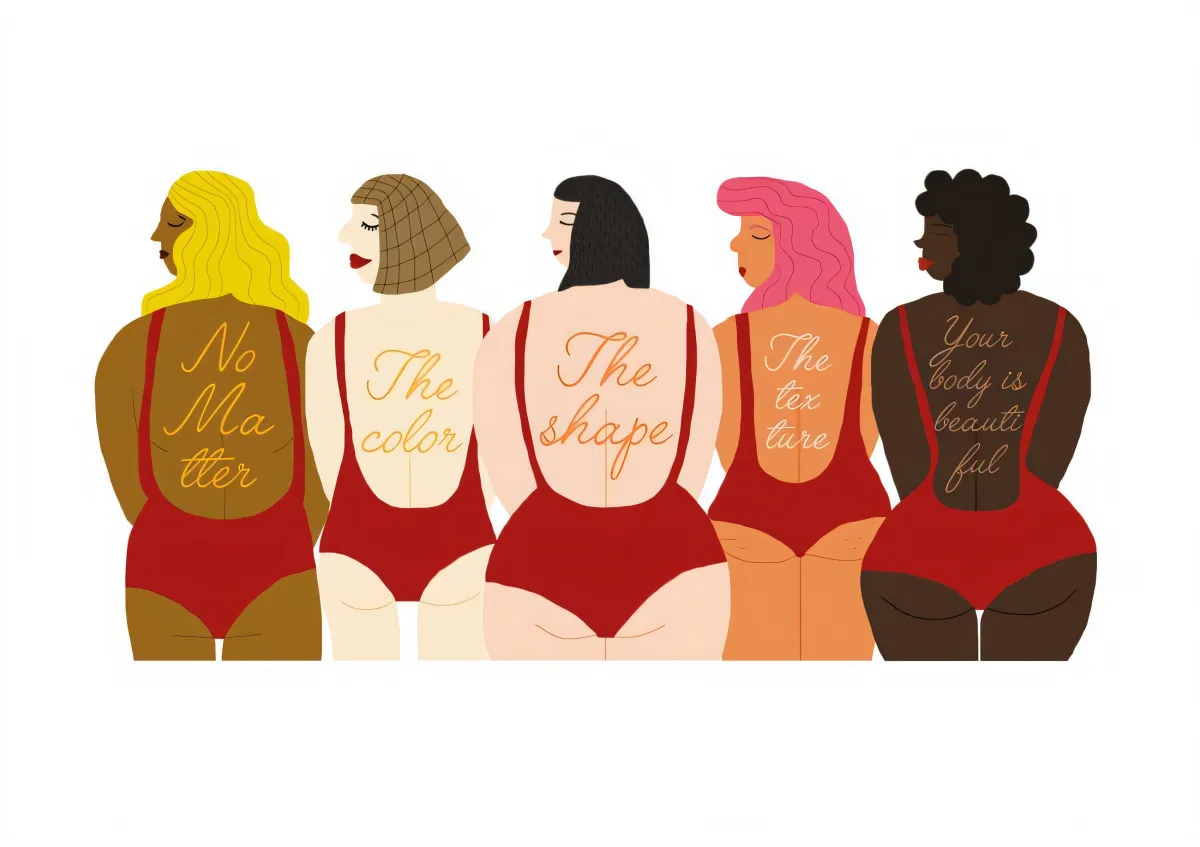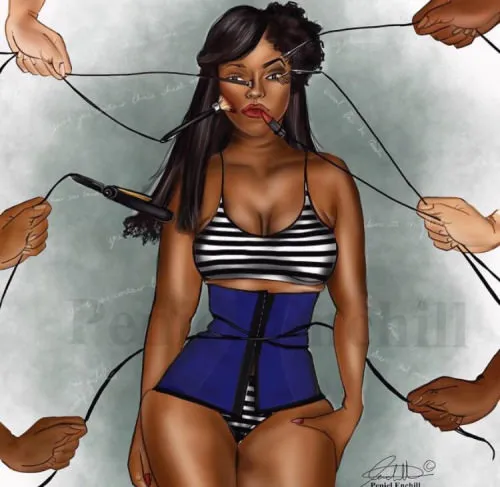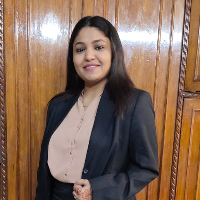A Girl Is More Than Just Her Size
I have never understood the idea of identifying any girl by her size as if it is the only visible thing about her. And the worst part is not only men recognize women as objects of size but also other women.
36-24-36, yes just three numbers to become and look perfect. Yes. these numbers exist – and not just in our pop-culture consciousness but in reality. Claiming that these measurements represent an impossible ideal is nothing new. People have been saying it for years and following it blindly.

Kim Kardashian is the torchbearer of the ‘big butt’ movement. Many black women and now almost every woman finds the big butt and big bust attractive, but what once the trend is over? Although like most feminists I’m sure, I don’t believe that body parts should be seen as fashionable or unfashionable commodities, I know that part of the reason I’ve become more accepting of my body shape is that it has become societally desirable.
I am talking about size because since I have hit puberty my ‘big butt’ has been the sole focus of my existence and identity. I remember back in school I used to pretend that I like being called ‘Matka - an earthenware jar’ because it was a joke and I was not supposed to feel bad about it. Honestly, I did not care much also as I was just a child and still growing up.
But soon after I lost a few extra kilos my ‘curves’ (the euphemism used for butt and bust) were accentuated and became the highlight of my whole being. I was already not so comfortable with my body, as most of us girls are not for being obese, skinny, and what not? For me, being curvy was also a struggle.
The unrealistic beauty standards often termed as 'body goals' are the toxic product of social media. With the rise of social media and the influencer market, there was a positive rise in eating disorders among young men and women. I seldom come across people who post their unedited or unfiltered photos.
Everyone seems to be so conscious about the smallest of small detail in their photo, their smile should be in place, arm fat should not show, they should not look too small, they have to hide acne scars and whatnot. The idea of a perfect photo and body only exists on social media, not in reality.

I was delusional that my body type is flattering and most girls kill for it but when I came across people (then friends) who would tell me, “hey, boys get attracted to you because you have a nice ass and figure” this so-called compliment became my nightmare. I got conscious about my appearance, I only bought clothes that would hide my ‘curves’. Loosely fitted kurtas, long tops that covered my thighs and butt, one size bigger pair of denim (nothing short).
Then, unfortunately, I ran into so many people who would only talk about my figure that it started to creep me out. I tried losing weight but nothing helped. My ex-boyfriends also told me how they were so lucky that their girlfriend had a perfect body (by which they meant my ‘curves’). I felt like I was living in an unwanted body. I started to doubt and question myself, thinking I lack something that people cannot see beyond my figure.
It took me longer than it should have to realize, I am much more than just my size. Before you ever shame anyone or even yourself, you should keep in mind one thing that people will always comment on. It is a vicious cycle and you have to ‘trust yourself’ first. Because if you cannot trust yourself you will not be able to love yourself. Women are not just a size, they have their own identity and want to be known for their skills, achievements, and the kind of person they are.
Opinions and Perspectives
The relationship between self-trust and self-love mentioned in the article is really profound.
More people need to read articles like this to understand the damage body objectification causes.
The pressure to conform to beauty standards affects every aspect of life, from clothing choices to social interactions.
It's concerning how young girls are when they start worrying about their body size.
The impact of these beauty standards on career and personal relationships isn't discussed enough.
Reading this reminds me to be more mindful of how I talk about bodies around others.
I appreciate how the author emphasized that self-acceptance is a journey, not an overnight process.
We should focus more on what our bodies can do rather than how they look.
The article makes me reflect on how I might unintentionally perpetuate these beauty standards.
It's sad how many women can identify with feeling reduced to just their physical appearance.
The way trends dictate what body parts are 'in' is really disturbing when you think about it.
I hope more people realize that commenting on someone's body, even positively, can be harmful.
The article really captures how exhausting it is to constantly think about your body shape.
We need more discussions about how these beauty standards affect mental health and self-worth.
The focus on numbers like 36-24-36 is so outdated yet still influences people today.
I'm glad the article touched on how these standards affect daily choices like clothing selection.
The pressure to look perfect in photos has gotten out of hand. Even casual pictures need to be 'Instagram worthy' now.
Reading about the author's school experiences makes me want to be more proactive in preventing body shaming.
The connection between social media and eating disorders needs more attention. It's a serious issue.
I find it fascinating how what's considered 'perfect' changes so drastically over time.
The article makes a good point about self-trust. Without it, external validation means nothing.
It's interesting how body trends cycle through different ideals, yet they're always equally unattainable.
The author's experience with ex-boyfriends is unfortunately all too common. We need to raise boys better.
We should be teaching children about their worth beyond physical appearance from an early age.
The social media angle is important, but let's not forget these issues existed long before Instagram.
I appreciate how the article acknowledges that this affects people of all sizes, not just those deemed 'too big' or 'too small.'
The part about buying bigger clothes to hide really struck me. We shouldn't have to hide our bodies to feel comfortable.
I never thought about how body trends could make someone feel temporarily better about themselves until reading this.
Interesting how the author points out that even positive attention to body parts can be problematic.
The article makes me think about how I talk about bodies around my children. We need to be more mindful.
This reminds me of my own journey with body acceptance. It's a continuous process, not a destination.
The emphasis on 'curves' being a euphemism is spot on. Why do we need to use euphemisms for our bodies at all?
I'm curious about how different cultures view these beauty standards. It seems very Western-centric.
The impact on mental health isn't discussed enough. Body image issues can lead to serious psychological problems.
Great article, but I wish it had included more solutions or ways to combat these issues.
The article could have delved deeper into the role of media in perpetuating these standards.
I wonder how many opportunities women miss because they're too focused on hiding their bodies instead of living their lives.
The part about trusting yourself first really resonated with me. It's the foundation of self-acceptance.
I'm glad the article mentioned how men contribute to this problem. It's not just a women's issue.
The concept of body parts being fashionable is so bizarre when you really think about it. Why do we accept this?
It's refreshing to read something that acknowledges both the positive and negative aspects of current body trends.
The pressure to look perfect in photos is exhausting. I miss the days when we just took pictures to capture memories.
We need more articles like this that challenge these deeply ingrained beauty standards.
The mention of unfiltered photos is important. When was the last time we saw a truly unedited photo on social media?
I used to think being called curvy was a compliment, but now I see how it's just another way of reducing women to their bodies.
What struck me most was how early these body image issues start. School-age children shouldn't have to deal with this.
The fashion industry really needs to do better with size inclusivity. It's 2023, and we're still fighting for basic representation.
I appreciate how the article addresses both sides of body image issues, whether it's being too curvy or too skinny.
The author's journey to self-acceptance is inspiring, but it shouldn't have to be such a struggle.
It's sad how many women can relate to this article. Almost every woman I know has a similar story.
We need to teach young girls their worth isn't tied to their size or shape. This should be part of early education.
The part about eating disorders increasing with social media influence is scary but true. I've seen it happen to friends.
Sometimes I wonder if we'll ever reach a point where women aren't primarily judged by their appearance.
I relate so much to feeling like people can't see past physical appearance. It's exhausting always being reduced to just your body.
The article makes a great point about how body parts shouldn't be seen as fashion trends. Our bodies aren't accessories.
True, but let's not forget that some progress has been made. At least we're having these conversations now.
The influence of social media filters and editing is creating impossible standards. I worry about the next generation.
Completely agree with trusting yourself first. That's where real confidence begins, not from external validation.
Can we talk about how harmful it is that these beauty standards start affecting girls as young as school age? That's just unacceptable.
The message about being more than just your size is powerful, but society still has a long way to go in actually implementing this mindset.
I find it interesting how body trends change. What's considered desirable now might not be in a few years, which shows how arbitrary these standards are.
The part about buying larger clothes to hide curves hit close to home. I spent years doing the same thing.
What bothers me most is how women perpetuate these standards against other women. We should be supporting each other.
The author's experience with ex-boyfriends focusing on her curves really resonates with me. Been there, felt that objectification.
I actually disagree about social media being entirely negative. It's also given platform to diverse body types that weren't represented before.
The story about being called 'Matka' in school is heartbreaking. We really need to stop normalizing body-shaming comments, especially for young girls.
I never realized how much the 36-24-36 ideal affected people until reading this. These numbers have haunted women for generations.
The Kardashian reference is spot on. They've completely changed beauty standards, but not necessarily in a healthy way.
While I agree with most points, I think the body positivity movement has actually helped many women embrace their natural shapes. It's not all negative.
The part about social media's impact on body image is so true. I find myself constantly comparing my unfiltered self to heavily edited photos online.
This article really hits home. I've struggled with similar experiences of being reduced to just my body type. It's frustrating how society seems obsessed with women's sizes.
